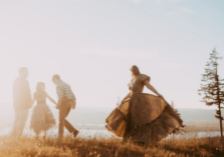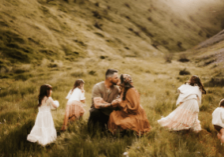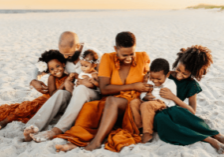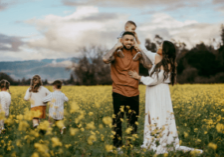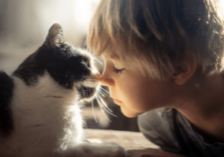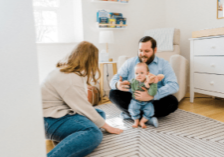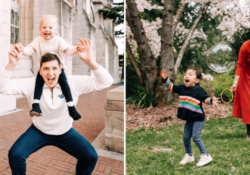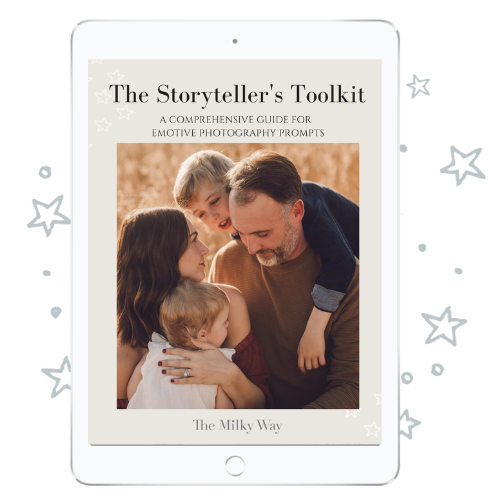Be the CEO: Managing Your Photography Business on Your Terms with Dorie Howell
As photographers and entrepreneurs, we have the gift of flexibility and being able to adjust and manage our business in whatever way works best for us. We can either be just another employee in our business, stuck to the whims of wherever the business takes us on any given day, or we can take control and start stepping into the CEO mindset as a business owner and use that flexibility to our advantage.
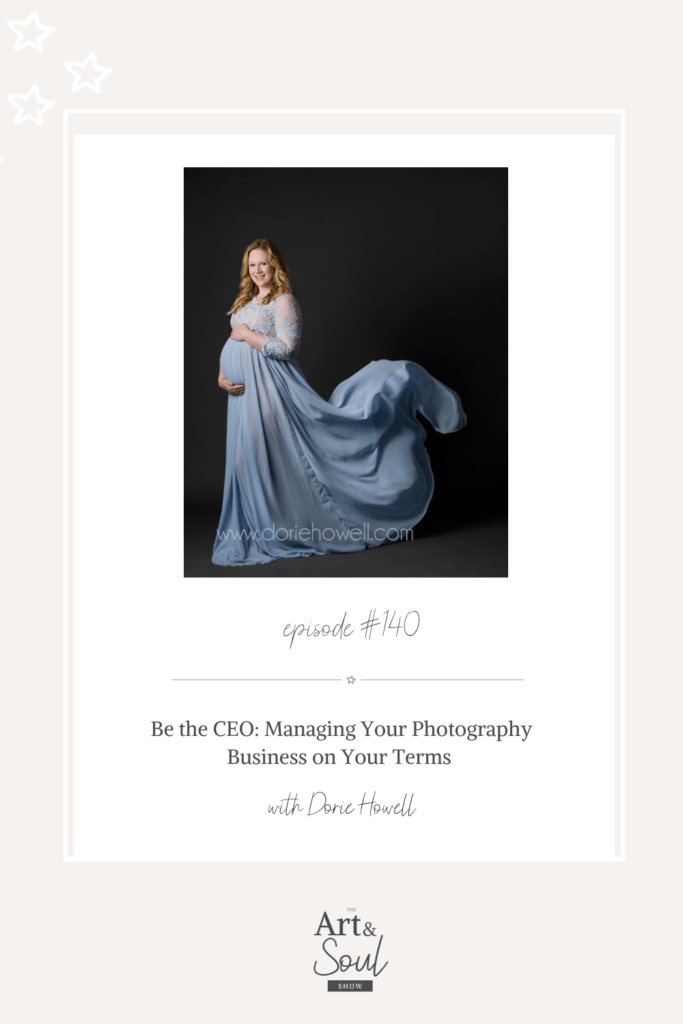
Dorie Howell is on the podcast this week to remind all of us to do just that: approach our business from the standpoint of a CEO. She’s a photographer herself, and one of her passions is helping other photographers envision the future they want for their lives, and then plan their business in a way that will support that vision.
In today’s episode, Dorie tells us all about her passion for creating businesses that support her life and the lives of her students in their own unique situations. She takes us through her own health journey, and explains how it’s made her a better business owner. And she encourages us to keep stepping out of our comfort zone, making big decisions, and thinking like a CEO so we can protect our time and energy to keep doing what we love.
What’s in this episode:
- [02:19] Dorie’s history with photography and how she’s pivoted her business
- [07:22] How Dorie’s phase of life means that she’s extra focused on creating a business that works for her life, not the other way around
- [09:22] How Dorie helps her students envision the life they want for themselves in the future, and then figure out how their business can support that
- [13:47] Why change is uncomfortable but necessary for positive change in your life
- [16:24] Why raising prices is such a multifaceted issue and how to soften the process for photographers
- [21:07] How the process of Dorie’s health improvement allowed her to become a better business owner too
- [27:39] How identifying which parts of photography you love – and which ones you don’t (and can outsource) – can help photographers protect their time and avoid burnout
- [30:40] Why you should be handling your business as a CEO instead of “just a photographer”
- [40:47] Why Dorie gets so much joy from teaching other photographers
If you’re ready to develop a CEO mindset and craft a business that supports the future you want for your life, tune in to this episode.
SUBSCRIBE: iTunes | Spotify | Stitcher
Resources Mentioned
Meet Dorie
Dorie is a published photographer serving the Northern Virginia and Washington, DC Metropolitan area. She loves serving her clients in all genres.
As well as running her photography business, she has also become a top photography mentor to other photographers. Her previous experience in the corporate world working in small professional offices taking care of everything from payroll, employee management, customer service, and sales, to running her own photography business, has given her the unique experience and knowledge to help creative business owners in any field.
Her favorite thing is helping photographers define their goals and give them the tools they need to to see success. She has worked with tens of thousands of photographers worldwide and loves seeing their businesses grow!
Dorie is a sought-after speaker, podcast guest, and teacher in the areas of marketing, social media, mindset and workflow released this winter.
Connect with Dorie
Did you love hearing Dorie talk about stretching out of your comfort zone and stepping into a CEO mindset? Check out another episode from Bryan Capporrici
Transcript
[00:00:00] Dorie Howell I always say that you can’t just raise your prices in a business. If you’re going to raise your prices, you have to evaluate your customer client experience. You have to look at your website, you have to look at your marketing message. You have to look at all these different things. It’s just not as simple as raising your prices. And the fear behind that is always, Well, no one’s going to hire me. I’m more expensive than the person down the road. And she’s busier than me, supposedly busier than me, anyway. And I truly believe that nothing happens without experimenting. So this is what I always tell people. No decision in your business is permanent. You can always change it. So you raise your prices for a season and you realize that really didn’t work.
[00:00:46] Lisa DiGeso Welcome to the Art and Soul Show, where we dove into heart opening chats on photography, business, life and that messy in between. I’m your host, Lisa diGeso, a mom, a photographer and entrepreneur. And I’ll be sharing honest conversations and advice for photographers with insight on mindset, entrepreneurship and creativity. The goal of this podcast is for you to be able to gain insights and strategies that will get you real results. Because, let’s face it, having a photography business can be lonely, but it doesn’t have to be. This is the place you can go when you need a boost of encouragement, a kick in the pants and inspiration to pick up your camera. This is the Art and Soul Show. Hello, my beautiful friends. Welcome back to this show today. I am super excited to dove into this conversation with Dorie Howell. Now, Dorie is a publisher typographer serving the Northern Virginia, Washington, D.C. metropolitan area. She loves to bring her clients in all genres, as well as running her photography business. She also has become a top photography mentor to other photographers. She is just a fountain of information and an all around good human. So I cannot wait to just dive into this conversation. Welcome, Dorie.
[00:02:02] Dorie Howell Thank you so much. I am so happy to be here and finally make this happ en. I love reaching out to other people’s audiences and just seeing if I can help them in some way. So it’s truly a pleasure to be with you today. Thank you.
[00:02:14] Lisa DiGeso So excited to have you. So, Dorie, just tell us who you are and what you’re passionate about.
[00:02:19] Dorie Howell All right. I am a photographer based outside of the Washington, D.C. area in the Virginia suburbs, like Lisa mentioned. And I recently pivoted my business to move away from newborn and family photography and focused solely on branding and commercial photography. It was a move that I had wanted to make for a really long time. I had been a newborn photographer known for that genre, oh gosh, for 12, 14 years. And you newborn photographers out there is such great work. But we know those sessions are long and they’re hot and they result in a lot of dirty laundry most of the time. Yeah. And that just. I just got to a point where I’m like, you know, I’ve done this for a decade. I think I can I can hang this hat up. So another side of my business is that I have been a photography educator for almost seven years now and teaching photographers all over the world how to run profitable businesses. And I used to focus solely on the IPS method, but I’ve realized, especially with the onset of COVID, that there’s so much more that we can offer our clients. If we look at it from the perspective of giving our clients what we want them to have and also what they want to have at the same time. Strictly apps for me was sometimes a little push in a poll of what clients wanted and what I knew that they needed to have. And so I’ve been educating and coaching my photographers lately about how to incorporate all the things that everybody wants into a cohesive package that makes everybody happy and also allows them to make what they need to make to stay in business and help their family or their personal financial goals.
[00:03:50] Lisa DiGeso I love that so much. Now, have you looked at pic time at all recently? Have you? Have you checked it out like the newest, hottest kid in town when it comes to I guess, an ordering systems. Have you checked that out?
[00:04:02] Dorie Howell I have. Check that out. And I’m a partner within photo and then photo does partner with big time. So that is a partner that I haven’t done a lot of investigations on. I know that when you have a system that works, then it’s a really great system in sometimes getting the urge to kind of switch over to something else is it’s a little bit difficult because yes, that in our ways, but it’s always good to keep. I love keeping an eye on how the technology is moving in our industry to help us be better at our jobs and make things more efficient.
[00:04:34] Lisa DiGeso Absolutely. I completely agree. So what happened to me in back in January of this year, I had a website hack and goodness. And the thing was, I actually hadn’t really updated my website since 2016.
[00:04:46] Dorie Howell You know, shouldn’t you know, it’s okay. You don’t have to confess. It’s okay. It’s okay.
[00:04:50] Lisa DiGeso Goodbye. Right. So it was really like I wasn’t really that sad about it, but I was like, I just don’t even have a website. So I ended up like kind of spinning my wheels. I was like, What am I going to do? And so finally I just hired over the summer someone to rebuild it on a show it platform for me, which I’m really excited to play with that a little bit. But what this kind of gave me the opportunity was, was I couldn’t get any leads. I wasn’t getting inquiries, I wasn’t getting leads because there was nowhere for them to go. Mm hmm. I took this as an opportunity of actually taking a year sabbatical from photography. I’ve decided just to take a step back and redesign my business with all the knowledge that I have now versus what I kind of bandaided together were.
[00:05:32] Dorie Howell Yeah.
[00:05:32] Lisa DiGeso So it’s just been such a but. Oh, my gosh, learning all these different systems and trying. It’s, it’s so funny because like, I remember the first time you opened Photoshop and you’re like, Oh my gosh, this is overwhelming. And I’m going to shut this down.
[00:05:44] Dorie Howell Because I still feel like the. Every time I open Photoshop. Now, like, I don’t know if that’s the example you want to use. I am I am with photographers that I do not get joy out of editing. I do not want to edit, I do not want to sit it out. I outsource all my editing as much as I possibly can. Photoshop is not I mean, I can, I can hobble through it really. And that’s what it is. Yeah. Hobble. But I just don’t think that my goal in life is to sit in front of a computer and do that kind of work. So I totally understand that the idea of being completely overwhelmed when you’re trying to look at all these simple systems and everybody’s trying to, yeah, promote like what they’re doing in all these different directions. And at some point in time, you just kind of have to put your blinders on and say, I’ve investigated it enough and this is what I’m going to use.
[00:06:31] Lisa DiGeso Yep.
[00:06:31] Dorie Howell And I love being decisive, but then also realizing, you know what if I don’t like it or if it doesn’t work six months from now, I can change.
[00:06:41] Lisa DiGeso It can change, right?
[00:06:43] Dorie Howell It’s not a forever permanent decision.
[00:06:45] Lisa DiGeso So that forever.
[00:06:46] Dorie Howell Yeah, right. Right. So how was that like? Basically starting over.
[00:06:51] Lisa DiGeso So I’m in it right now. So I’m actually taking I won’t be back. I won’t be returning. I just actually did my last newborn session on Monday and I won’t be returning until fall of next year.
[00:07:00] Dorie Howell Okay.
[00:07:01] Lisa DiGeso So I’m just taking my son’s turned 13. He is in grade eight, he’s doing football. And I was like, you know, like I maybe only have four or five years left with this guy. So like, do I want to be spending my evenings shooting and editing this fall? And I kind of came to the conclusion that I was like, I don’t really want to do that.
[00:07:22] Dorie Howell I totally get it. You have the football player and I have the cheerleader. I have a 14 year old cheerleader, Sammy, 15 and two and a half weeks. And our life is all starts here all the way over here in the States. That’s a really big deal and a big time commitment to three hour practices every single day where football games every night were competitions on the weekend. And it is something to say that I need to have a business and I think all photographers need to have a business that fit around the life that they want to be able to create for themselves. And you and I are both in a time where right now our lives result revolve around our kids. And it’s not going to it’s not going to last forever.
[00:08:00] Lisa DiGeso Right now, I think just finally getting real with yourself and being honest about that. Things can shift and they do change and being okay with it and that it’s okay to shift and change your business based on your season. I like you.
[00:08:14] Dorie Howell 100%, 100%. Your business is there to support your life and the life that you want to create for you and your family. It’s not the other way around, like hundred percent, 100 there to to supplement and make things possible for you. So that’s what I talk to all my clients about, too. It’s like, no, I don’t think you I don’t know if we want to go that direction because I’ve had enough experience and you have to of knowing that some of the decisions that we make now, if you stick with them, they’re going to become overwhelming or it’s going to be too much or you’re not going to be able to handle it when business really picks up. So we want to think strategically when we start, if at all possible, to avoid some of those problems that you and I’m sure have both experienced since we’ve been doing this for so long.
[00:08:59] Lisa DiGeso Oh, those are lessons. All those lessons.
[00:09:02] Dorie Howell Absolutely.
[00:09:03] Lisa DiGeso So I think one thing photographers rarely stop to think about is what do I truly want and what does success mean to me? Because I think when I hit Extreme Burnout, I finally realized I was running someone else’s model of success. So can you share how you help your students define what their goals are and what success is to them?
[00:09:22] Dorie Howell Well, when I’m working with my coaching clients, when they’re going through the onboarding process, we spend quite a bit of time and they spent they fill out a good amount of questionnaires about what is their vision for their business, how does this fit into their family? How does their what are their goals, not just business goals, but what are their personal goals? Five years, ten years and further down the road, what did they how did they see their life rolling from wherever they are now into the future? And how does their business fit into that? And it’s a lot different than someone say, okay, what do you want your business to be in five years? What do you what about ten years? What is your business going to do? What is your business going to know? We need to be thinking about personally what’s best for us. And then like I’ll just say it again and again again, how our how our business can help support that. And I think a lot of people get tied up in the idea that if it weren’t for somebody else, then that’s the way that I need to do it. So they copy someone else’s business model or they copy someone else’s ideas or methodology, and they they take that on as their own, but it never really feels like it’s in alignment with what’s true to them. And then you do that for a period of time, whether that be a year or five years, and all of a sudden you’re like, I am not happy. This is not what I. Wanted. This is not working for me. And then you have a total crisis of identity.
[00:10:51] Dorie Howell That’s the last thing that I want for people that I work with versus starting at the very beginning of really learning about what’s going to work for them in their life and how they want to grow. But also really understanding that no decision that you make is permanent. And we need to have a little bit more of a flexible mindset when it comes to what success means to us. The type of business that we want, knowing that what we envisioned at the beginning, is probably not where we’re going to end up. And being okay with that and understanding that that truly is part of the entrepreneurial journey and that isn’t taught a lot in our business. So that is something that I work a lot with and with my clients is the flexibility of knowing we can pivot at any time. We can make changes at any time. We can reevaluate at any time. And we can figure out what works best. And the great thing is that some people might think of that as a negative. But the thing that I love about it so much is the fact I think that is our biggest, biggest luxury as entrepreneurs, that we can have that flexibility. That’s why we go into business for ourselves. But it takes a while sometimes for people to truly get that in their mind of being. Wait a minute. I can make that decision and it’s okay. That is the one thing that I love helping my clients with so much.
[00:12:12] Lisa DiGeso I think a lot of the times we forget that we are the boss, right? You know, like it’s not someone telling us. Like, I remember having that epiphany when I realized I don’t have to work weekends. I don’t have to I don’t have to take clients on weekends at all. But it took me a long time to get there.
[00:12:28] Dorie Howell Right? Well, I think some of it so is like especially when you’re new and you you perceive that you have oversaturated, quote unquote, oversaturated marketplace that you need to be available whenever your clients are available. So of course, you’re going to be working on weekends. But the thing is, typically, if your work is really great and your experience is really great, clients will come to you when you’re available. You can set those working hours and you don’t have to be available on weekends. I don’t shoot. I might shoot a session on a Saturday depending on the situation, but I do not work on Sundays. I absolutely do not work on Sundays. That’s been a hard stop for me my whole career. I do not work on Sundays. Sundays are for church, Sundays are for family, and that’s just the way that it is. I don’t think that my business has suffered because I’ve drawn that line in any way. People come find me when they want to.
[00:13:18] Lisa DiGeso Know, I think. And also I think boundaries make us better businesspeople anyway.
[00:13:23] Dorie Howell Yeah, for sure.
[00:13:25] Lisa DiGeso For sure. So I think overthinking and overwhelm and maybe a little perfectionism and an imposter syndrome all rolled into one stop so many photographers from creating the business they want or that they’re capable of or that or charging and being profitable even. So can you share how you coach your students to get out of their own way and to actually take action?
[00:13:47] Dorie Howell That the very first thing that I tell my coaching students when they come on to work with me is I say, I’m going to ask you to do some things that are uncomfortable. You need to know that right from the start that any type of change is uncomfortable. Any type of area where you want growth, you’re going to have to make a change, a major change. The best way that I can describe that is I’ve recently lost £110 and I’m still on that journey. But that is not an easy journey. And I had to make a lot of uncomfortable changes. And I still fight my mind every night before I go to bed. You know, I want a cookie. I do. I most people do. I want a cookie. Or when we go out to eat, I want to eat certain things. But it’s a constant situation where I’m putting myself, not what I’m physically uncomfortable, but where my brain is fighting with itself because it wants it older. You really want this little good, double bad bag, double double angel on your shoulder.
[00:14:46] Lisa DiGeso Just think. Oh, just right.
[00:14:48] Dorie Howell Yeah, just one.
[00:14:49] Lisa DiGeso Just one.
[00:14:50] Dorie Howell Well, you do that every night. And for someone like me who has struggled with that particular issue, that’s a big deal. And so that’s an analogy that I use with my clients. It’s like, listen, any time we’re going to grow, it’s going to hurt. Anytime you want to get stronger in the gym, you’re going to have to exhaust those muscles and you’re going to have muscle soreness the same way your brain is going to tell you, Oh, I don’t want to do this because it’s going to hurt your brain is there to try and protect you even when it doesn’t really know what it’s doing. And so we go through those those steps of knowing this may not be comfortable all the time. And I need to trust in my in my coach and I need to trust in the process that what’s on the other side is better than what I’m experiencing now. So we tackle that from the very, very beginning, and I make no apologies for that whatsoever. And I say, listen, if you’re adamantly opposed to something. Let’s have a conversation about it. And tell me where these feelings are coming from. Tell me what the objection is coming up. Why you may not want to do a certain marketing idea or why you won’t. Don’t want to maybe call a certain person or that type of thing. Let’s figure that out. But usually it’s just a matter of our brain saying, Oh, we’ve never done this before. Are you sure this is safe? And us training ourselves not to listen to that voice.
[00:16:09] Lisa DiGeso Yeah, it’s so true. Now let’s talk about photographer’s biggest fear raising our prices. So what mindset shifts do you feel photographers need to make to see their value and confidently charge and raise their prices?
[00:16:24] Dorie Howell I think this is such a this is such a multifaceted issue because it’s not just one thing. It it gets into how people were raised. It gets into their thoughts about money, their thoughts about wealth, their thoughts about crew being able to create that wealth for themselves. It’s not just a matter of, oh, you know, suck it up and raise your prices and put a few more pretty pictures on your website because we know it doesn’t work that way. I always say that you can’t just raise your prices in a business. If you’re going to raise your prices, you have to evaluate your customer client experience. You have to look at your website, you have to look at your marketing message. You have to look at all these different things. It’s just not as simple as raising your prices. And the fear behind that is always, Well, no one’s going to hire me. I’m more expensive than the person down the road. And she’s busier than me, supposedly busier than me, anyway. And I truly believe that nothing happens without experimenting. So this is what I always tell people. No decision in your business is permanent. You can always change it.
[00:17:25] Dorie Howell So you raise your prices for a season and you realize that really didn’t work. And I’m not happy with this. It doesn’t feel it doesn’t feel genuine to me to be priced at this level. And that’s a whole nother issue in and of itself. If it doesn’t feel genuine to you, that probably isn’t the truth, but it’s just what your brain is telling you. But I always say, Listen, let’s raise them up. Let’s try it. Let’s see what happens. If it doesn’t work after, you know, five or six inquiries, then let’s reevaluate. I’m most likely not going to say, oh, we’re going to lower them back down, but we’re going to look at all those other things I mentioned earlier to see what where is that disconnect? Because I can’t say this for all geographic areas. And I truly, truly do believe that I can charge a lot more in the Washington, D.C. suburb than maybe someone can in rural Iowa or rural Dakota. Like it is a different being in those areas. But most of the time peop the reason people are not hiring you is not because is it isn’t because of price. There’s something there’s some other disconnect somewhere that they are feeling which makes them not want to say yes. So we go through all those things.
[00:18:38] Lisa DiGeso And how would it how would you work with your students to discover where that disconnect is?
[00:18:43] Dorie Howell I do a lot of investigating into them. I spend a lot of time behind the scenes looking at their website, looking at their their social media, looking at their imagery and making sure that everything is working together seamlessly. Sometimes it’s in communication style. We get in there, they’re charging really, really high rates. And I read through their website and it has grammar mistakes and things don’t make sense and it’s not fluid. Or we look at their emails that they’re sending to clients throughout the workflow are those cohesive and professional and really elevated to the level that they need to be. So I spend a lot of time digging into those different things, and I also do a lot of demographic research to where do they live, what’s the median income, where are they located, that type of thing. Not because that’s a prime way that they need to set their prices, but those are numbers that they need to be aware of. So a lot of research.
[00:19:35] Lisa DiGeso Yeah, interesting. I love that. Interesting. So you mentioned that you’ve been on a bit of your own health journey. When I was reading it, you had mentioned that you have found this journey has made you a better entrepreneur. So can you share a little bit more about, you know, your experience with losing 110 pounds? Congratulations.
[00:19:54] Dorie Howell Thank you. For you.
[00:19:56] Lisa DiGeso I know.
[00:19:56] Dorie Howell I kind of. It’s not easy. It’s not easy. I’ve been very fortunate to be surrounded by very supportive family and very supportive medical, you know, my doctors and that kind of stuff. I’ve done it in a safe way and and all of those things so that we just, you know, can check that box off. And I’m perfect. I’m very healthy and I’m not done with my journey yet. But I think for me, the weight was was something to go. Back at the beginning of COVID, my mother was ending a very in over a decade fight with cancer. And she passed away from cancer literally the day before schools and everything closed here. So there was that. And then through counseling and then my husband got COVID very on my and my husband, I would say, got the scary COVID, you know, when you were like, oh, my gosh. Like, Yeah, everything’s really. Now. I mean, I’ve had it. He’s had it two times. Everybody’s fine. But that was the time when it was, like, really scary if you’re really scary. And so there were so many things that were happening all at one time that cookies, like I said, cookies are a good friend. They don’t talk back. They don’t die on you. They don’t, you know, all those different things.
[00:21:07] Dorie Howell But my daughter was having some specific issues and we had enlisted the help of a counselor for her. You know, when you get pulled out of school, I think a lot of kids did during that time. And I don’t think we’re going to know the effects of that for a very, very long time. But in talking with her counselor, the counselor said to me, you know, Dory, have you ever unpacked some of these things that you experienced as a child and how they’re impacting you now in dealing with certain things? And I never had so I went I got that the help of a counselor. And I think the weight issue was more of a it was during an emotionally heavy time and that extra layer of just being unhealthy and not feeling good all the time that, you know, I had high blood pressure, I had sleep apnea. I didn’t want to climb up stairs like sessions were extremely hard, any sessions that I was doing at that point in time.
[00:22:03] Dorie Howell When you feel the emotional weight of that at some point in time. You either have to do something about it or you need to stop complaining. And I was never a complainer about it, but I knew it was impacting my life in a negative way, and that if I didn’t dramatically change something, I was simply I wasn’t going to be around very much longer. So I found that as I lost weight, I was happier. You know, and the thing is, is you wouldn’t notice that if you saw my social media stuff, you would never know what was going on behind the scenes. But as I dropped the weight and got lighter physically, I got lighter emotionally. And I was free to experiment and to do different things and to just interact with my clients in a different, more confident way. Yes, I feel like I got my confidence back, even though I faked a lot of it before. I feel like I truly got my confidence back. So taking that emotional weight off of myself, I became a better mom. I became a better wife. I became a better business person. I was more confident in the decisions that I made when it came to my business. I had the courage to completely pivot into a new genre and not feel like I had to hold on to the past. And so that’s kind of the high level of how that greatly has impacted my business. And it was something that I didn’t share for a really long time because I don’t feel like you need to share every little step that you make on social media all the time. It’s okay to keep some things to yourself, and I didn’t share it. It wasn’t until I did one Tik Tok and I remember saying, Oh, that shirt wasn’t a TikTok, it was a real. And I said, This is where people are going to notice. Like I knew it like that the way the angle was and the shirt fit and everything that was about £70 in and I’m like, I’m going to get this is going to. And sure enough, the messages came in.
[00:24:01] Lisa DiGeso Like the.
[00:24:02] Dorie Howell Private messages came in. What are you doing? How are you doing this? How are you doing this? I’m like, well, you know, you just kind of got to stop. You got to it’s uncomfortable. Just like in our business, it’s the same thing. So the same thought process that I deal with my clients as far as this is going to be uncomfortable, expect it to be uncomfortable. Welcome that lean into that is the same thought process that I need to do with my health journey. And so making that connection between the two, understanding that that’s just how it is in life. Any time you’re going through a change and if I want something bad enough, then I’m going to lean into that uncomfortable feeling. And that’s something that is easier for me to do when I’m happier or when I’m healthier, when I feel like I’m taking better care of myself. So it’s all it all kind of feeds off each other.
[00:24:48] Lisa DiGeso I love that. Now, what advice do you have for plateau or when things are not in just just in like your health journey, but also in business when things aren’t moving and you’re not seeing the results. So how do you bust through that?
[00:25:04] Dorie Howell Well, with health, with the diet, it’s easy because I’ve certainly hit my plateaus of like six months of nothing happening. And I just. Yeah, trust the process story, trust the process, trust the process. And then one day you wake up and it happens with business. But also it’s very much the same in the fact that with your health journey you also have to start realizing, okay, what have I let things slip? Have I started letting old habits creep in? Have certain things started happening that maybe I’m not being honest with myself about doing that? So if you have a business plateau and you’re not getting inquiries, am I posting as regularly as I used to post? Am I sending out my emails to my clients the way that I used to? Am I following up on my inquiries in a timely and professional manner? So take it. Take that sort of self-evaluation and make sure you’re you’re keeping yourself on track because it’s really easy in any part of life to let those little things start happening and creeping in. And once that starts happening, then other things start to slip and other things start to slip. And next thing you know, you don’t have any inquiries and the scales not moving. So, you know, it’s just it’s work. You got to you got to really keep yourself accountable to those things. And also, really, I think with photographers, too, in business, when you’re going through that process of analyzing all those different areas of your business is really being honest with yourself of how long have I been doing it this way and do I need to make a change? And what does that change look like? How can I strategically change something or pivot something in my business to get the attention that I need or the response that I need? Because sometimes people will just keep posting, just keep sending emails, just keep doing well after a certain amount of time if they’re not working, you need to be honest with yourself that this isn’t working. Maybe I have some blind spots that I need to get some help with and have someone else take a look at this. Because I obviously, you know, you don’t want to go to three months without an inquiry because you need a business. You need to make money.
[00:27:05] Lisa DiGeso Yeah, exactly. Oh, I love that. Well, congratulation. Well, thank you. All right. Looking in your face. I was like, Oh, my goodness.
[00:27:14] Dorie Howell Yeah.
[00:27:15] Lisa DiGeso I love it. So let’s talk a little bit about burnout, because it is a real thing in our industry, especially our industry. And I know our listeners and truth be told, I also have burnout periods myself. I am a bit of a workaholic, so there becomes a timer and the last thing I really want to do is work on my business. So what advice do you have for avoiding even getting to burnout?
[00:27:39] Dorie Howell Couple of things. One is you need to remember why you got in this profession in the first place. What is your. Some people call it your why. Some people. What is fueling that spark don’t necessarily stop doing what’s fueling your spark. But I think a lot of times photographers get burnout, especially in the fall, because with so many family portraits and holiday portraits and that type of stuff, it’s because they haven’t strategically set up their business for success, meaning they’re still the ones doing the editing really late at night. They’re still the ones answering all their inquiries. They’re not getting the help that they need, even on a seasonal basis. It’s a lot easier to have a team meeting three times a week and say, okay, you handle my emails. How are those going? You handle my social media. How’s that going? You’re my editor. How’s that going? You’re the one that puts all the galleries together and places all the orders and being able to outsource those things and actually run it from the position of being a CEO versus just a photographer. Yeah, because that’s what we need to do in our business. We need to run it as a CEO. And yes, CEOs might do all the tasks in the job, in the business when they’re really, really new. But in order to grow, they need to hire people to do those things for them. So changing that mindset of being, like I said, instead of the photographer, changing it to a CEO mentality and then really working on outsourcing, so you’re more directing all the different hands that are doing things because that gives you the free time to go out. And if you just want to photograph people and then pass everything else off.
[00:29:15] Lisa DiGeso Yeah, it’s.
[00:29:16] Dorie Howell Totally okay for you to do that. It is perfectly fine to have someone else edit your images that doesn’t make you less of an artist. Ansel Adams didn’t do his own darkroom work.
[00:29:26] Lisa DiGeso Interesting.
[00:29:28] Dorie Howell He didn’t. He has. In fact, you can the the his darkroom artist has a really great blog and I don’t know what off the top of my head, but his darkroom artist has a really great blog going through Ansel Adams, the process, the workflow that they use so that he knew what Ansel wanted from the final result. So if you look at that and you realize, wait a minute, if Ansel Adams didn’t edit his own images, it’s probably okay if I don’t either. So protecting your time, protecting your your spark and outsourcing the things that do not bring you joy. Because that’s what a real a real CEO does.
[00:30:07] Lisa DiGeso It’s so true. It’s as soon as, like, you get in the mud with like doing the tasks that aren’t lighting you up. Yeah, it absolutely what starts the burnout process and you’re just like, I use I, you’re like, I just want to do anything on Netflix or nothing.
[00:30:23] Dorie Howell Right. Or pretend to edit while I have Netflix in the background and you’re like, I’m watching more Netflix than editing.
[00:30:30] Lisa DiGeso Yeah. Yep. Yeah. So what advice would you have for someone who is just getting started as a photographer?
[00:30:40] Dorie Howell I think if you’re just getting started as a photographer, I think one is. First of all, you need to be good at your craft. So be honest with your technical and your camera skills and that you need to have a product that you can sell. Number one. Number two, realize that if you’re going to do this and as soon as you start charging, you are running a business, you are no longer simply. I hate using the term just a photographer, but you are no longer just a photographer. You are the president. You are the CEO of your business. Treat it accordingly. Make sure your price the way that you need to price. Make sure that when you get to a point that you are outsourcing the work so that you’re not tied to the computer all day. Make sure you have a great business in marketing plan. It is now a business and by you doing that, your clients will notice that as well and you will be more respected in your field because you are treating it like a business. Yeah, it’s really easy to kind of be talked down to if people think you’re just a hobbyist. Yeah, but once you raise the bar into true being the president of your company, you will get much more respect from your community and your clients when they know I have no problem telling my clients at all. Okay, listen, we’re going to have this session. We’re going to do this. Here’s the steps, and then I send it out to my editing team. And that takes this amount of time. And when I get those images back, then this happens here and this is who you’re going to hear from. If you don’t hear from me, you’re always welcome to contact me directly. But I have no problem letting my clients know that it’s not just me.
[00:32:16] Lisa DiGeso Yeah, I love that.
[00:32:19] Dorie Howell That gets me, I think more respect as a business owner in my area versus someone who’s just trying to piecemeal it all together. Yeah.
[00:32:25] Lisa DiGeso Exactly. So making the switch when you switched from the family newborn to completely brand photography, I’m sure that has been a huge difference, especially in your local community. Like so do you find that you’re doing a lot more locally? Are you having people from all around?
[00:32:42] Dorie Howell It’s pretty much it’s local right now. It’s very local because I just basically shut down one business and started a new baby business, right? It’s my little baby business. So what I have now is a baby business. Like I let the old mature business go and I’m starting out a new business and granted it’s in photography, but it’s a completely different way of marketing and how I relate to my clients. So I sent out an email and I continued to send out an email to my list to let them know what’s going on. People are calling me and saying, Explain branding photography to me. Like, what exactly do you do now? And so we have those conversations and just really diving into it. It’s it’s so great knowing that the person that I’m talk to talking to is the person that I’m actually going to photograph. So I can ask more pointed and more direct questions. Not that parents can’t answer those questions for their children or their newborns because they can. But usually what we’re satisfying is what they want from their kids versus now I’m talking to what they want for themselves and it’s very different. And sessions are quicker.
[00:33:46] Lisa DiGeso Because they.
[00:33:46] Dorie Howell Follow directions, let you know much, usually much better than a two year old at a session. So the sessions are quicker. There’s also a respect like I spoke about treating your business like a business and you’re the president. Like when I’m dealing with CEOs and entrepreneurs and that type of thing, there’s kind of a mutual respect for the conversations that we have during sessions are very different. They’re about business, they’re about business growth, they’re about marketing, they’re about the current cultural norms and that kind of thing in the area. It’s it’s very different and I find it very refreshing at this point in time.
[00:34:21] Lisa DiGeso I love that. I love that. So how do you find like shooting for social? Are you doing a lot of that too and finding that’s part of your process?
[00:34:29] Dorie Howell Yeah. You know, I a lot of my clients are coming to me now for more corporate type things for websites, annual reports, LinkedIn and things like that. The branding sessions, it’s going to take me a little bit of time to rev up that part, that side of the business. But commercial headshots are my bread and butter and I love doing them. I’m hooked into a couple of good companies in the area so that whenever they hire new people or whatever, they just send them over and we do it and it’s very it’s great. So the commercial side or the branding side of things, I have a nice portfolio of things of clients, but it’s continuing to grow and I’m continuing to refine that process of how that needs to work best for me. You know, same boundaries need to be put in place. So I don’t do I don’t do weekends and we need to do at a certain point in time. But I’m being more strict about hair and makeup and wardrobe, and I’m finding that I’m stepping into the level of customer service with these clients that I wanted to offer my family clients. But my family clients weren’t always receptive, too. But these clients are all.
[00:35:32] Lisa DiGeso Receptive.
[00:35:32] Dorie Howell To it. They want because it’s them. They want the hair and makeup, they want the styling advice, they want the help with locations. And so it’s it’s just it’s a much it’s a closer, I find. It’s a. The connection between what they want and me providing the end result that they’re going to love. But then it’s still ramping up. I ended. I get the whole promoting business and it’s tricky in finding the right mix. And in all of that, I’m right in the heart of it, just with everybody else.
[00:36:01] Lisa DiGeso I love that. It’s so great. Well, I’ll tell you, I have to let you know. I have to dove back in to have the advice of experience, right?
[00:36:09] Dorie Howell Yeah, you do. You really do. The times have changed so much that I would be hesitant to probably work with anyone who wasn’t actively working right now and who was coming out of COVID. Because times have changed, clients have changed, the industry has changed. And I’ve been doing this for so long. I see major shifts in the industry about every five years.
[00:36:32] Lisa DiGeso Yeah.
[00:36:32] Dorie Howell And recently I was just like, Yeah, we’re in the middle of a major shift, a major shift to certain things. And you got you got to be careful who you learn from. That’s just, you know.
[00:36:44] Lisa DiGeso The truth.
[00:36:45] Dorie Howell That way.
[00:36:46] Lisa DiGeso Yeah, not wrong. So, are you ready for our lightning round?
[00:36:51] Dorie Howell I am so ready. I was so excited when you said there was going to be a lightning round. I’m like, Oh, my goodness, I hope I live up. I hope I live up to it. All right.
[00:36:59] Lisa DiGeso Coffee or tea?
[00:37:00] Dorie Howell Oh, t 100%.
[00:37:02] Lisa DiGeso Most luxurious vacation you’ve ever been on.
[00:37:05] Dorie Howell Probably my honeymoon to Tahiti. That was pretty nice.
[00:37:10] Lisa DiGeso Nice. What’s your outcome? That song that perhaps you up when things are rough?
[00:37:14] Dorie Howell Oh, I. Well, my. My former life, I was an opera singer, so I am a musician by trade. And so I love all kinds of music. And so it really just depends. Do I want a little Broadway music? Do I want a little pop? Do I want some spiritual music, that type of thing? But when I’m working out, it’s ridiculous. Things like babies got back and like all those done, like I love like retro songs that just had a really good beat and dumb lyrics that, okay, I can I can do it, I can do it, you know, ten more minutes, ten more minutes, that type of thing. So but a lot of times I work in quiet. I don’t use music as a background because it’s so distracting to me because I’ll end up getting lost in that. And 3 hours later, I won’t have gotten anything done.
[00:38:02] Lisa DiGeso Oh, that’s so funny. That line, the weekend I was making clam chowder for my family and I said to my husband, I was like, Either I can put my headphones on or I can put on the home stereo. Mm hmm. And he’s like, I would prefer it if you just put your headphones on. I put on monster ballads like your ballads, and I was singing like the whole time. He’s like, I’m not sure what’s worse, right? Like, what are you thinking? Like, monster ballads or listening to.
[00:38:28] Dorie Howell Right. Like, he’s like, Oh, I might have made the wrong decision there.
[00:38:31] Lisa DiGeso Fatal errors or I love it. I love it. What was your favorite show as a as a kid?
[00:38:39] Dorie Howell Wonder Woman.
[00:38:41] Lisa DiGeso Good. One last thing you did for yourself as an indulgence.
[00:38:45] Dorie Howell I’m a pretty good receiver of indulgence things, so I get my nails done regularly. That’s something that I actually started when my mom was really sick because that was something that she did and I started doing that, and that hasn’t gone away. But I love, you know, getting my hair done. But sometimes it’s just hiring a trainer for a couple of sessions to like because I have different goals. So there’s lots of different ways to be of being indulgent. And usually it’s something for me it’s physical. It’s not going out and buying a purse or a dinner out or something. Usually something that I can do. For me personally.
[00:39:23] Lisa DiGeso I love that. I love that I started doing massage every two weeks. Yes. And it’s like.
[00:39:32] Dorie Howell It’s not the best.
[00:39:32] Lisa DiGeso Thing. It’s so great. It’s doing great.
[00:39:35] Dorie Howell Massages, facials, pedicures, like pop it, bring it all. I love all of it.
[00:39:39] Lisa DiGeso All of it. Spa day. So morning person or night owl.
[00:39:44] Dorie Howell Night owl. But I am. I’m always on a quest to be more of a morning person. Right.
[00:39:52] Lisa DiGeso I know. You know, it’s like permanently exhausted pigeon, right? I love it. Yeah, that’s exactly it. What did you want to be when you grew up.
[00:40:03] Dorie Howell A Broadway star?
[00:40:04] Lisa DiGeso Ooh, I love. Mm hmm. Go to karaoke jam.
[00:40:08] Dorie Howell Oh, yeah. 100%. Yeah. Let’s go. Right.
[00:40:14] Lisa DiGeso You sing.
[00:40:15] Dorie Howell Oh, I’ve sung all sorts of things at karaoke, because, like, when we go on vacations, like if we do a cruise or four at a resort or something, they always have a karaoke night. Not just to my daughter, you know, she’s 14. To her horror, her mother will actually get up and sing. And my husband loves it and she wants to hide behind the furthest possible. Right. So I’ve done things from the greatest showman. I’ve done Whitney Houston. I’ve done all sorts of various things. It just depends on what strikes my fiancee. Yeah, that particular.
[00:40:42] Lisa DiGeso Love it and love it. What makes your soul light up?
[00:40:47] Dorie Howell I’m my family. And just being alive, I think it’s just the gift that we’re given. Being able to meet different people and interact with different people. And then just professionally, I love seeing my students succeed. There is like there is nothing better than waking up to an email or a message from someone saying, I raise my prices and my next three you know, my that inquiry we talked about on that call, she booked. No questions asked. And I’m like, Yep, yeah. And because that that dramatically helps them. It’s not just about, oh, they made more money. It’s like the freedom that that financial gift will give to them and their family. It’s goes so much deeper than just a higher deposit in their bank account from a sale.
[00:41:36] Lisa DiGeso It and the belief that they can do it.
[00:41:38] Dorie Howell Yes. And letting them see bit by bit by bit the potential that they have in their business. I always tell my clients to I’m like, my goal with you is to make sure that we get to a point that you don’t need me anymore. That is, it’s like it’s like just like with my daughter. I want to set her up so that she’s ready for life outside of the home. And that’s how I do it with my photography clients. Like, I don’t want you to feel like you have to pay me forever. I mean, you can, but ultimately I would. I want you to to be able to fly on your own and be confident in the decisions that you make and make. Make this business truly something that you wanted to be. And I love it. I love it when I see glimpses of that happening. It’s so it’s so it’s just an honor for me to see it. I know that they love it as well.
[00:42:26] Lisa DiGeso I love that. Where can our listeners learn more from you?
[00:42:30] Dorie Howell Well, I’m always available on the social so you can find me. My primary place is probably Instagram and that’s I’m at the Dorie Howell D.O.A., i.e. h0well so the Dorie Howell I do have a Facebook page. My coaching practice is called Harmony Hangout. So Harmony Hang Outcome is my coaching page and also are my coaching website. And then also you can find that same thing on Facebook as well. So you can reach out to me in all those different places.
[00:42:58] Lisa DiGeso And you have a podcast, you do it here.
[00:43:00] Dorie Howell I do have a podcast. It is called a Focal Points Podcast. It is sponsored by in photo and we release a new episode every Wednesday and we talk about all sorts of different things, wide variety, a lot of different a lot of different topics going on over there.
[00:43:16] Lisa DiGeso I love it. So I love to end my interviews with this last question. And it is, Oh, what are you curious about or artistically curious about right now?
[00:43:25] Dorie Howell I am artistically curious about pizza making, which is very random. I know, but I. That’s kind of my thing in the kitchen is me in the making these pizzas. And so I finally perfected my thin crust pizza and now I need to deep dove into a more thicker crust pizza. So that is where I spend a lot of my creative curiosity these days. And then the next thing I need to be curious about is I need to make the transfer from a DSLR into our mirrorless camera. And I’ve been doing that, dragging my feet and I am one right. I have to I, I’m using it right now for video. I’ve been using it forever I think. Oh great. You need to really take that on a session and you need to use it and you need to transfer over. But you know, old habits die hard. So that’s why I’m creatively curious about the pizza. But as far as the business goes and something that I need to be curious about, we can hold ourselves accountable to that. We need to brush off these mirrorless cameras and learn how to use them so that we can take advantage of the technology they are actually.
[00:44:34] Lisa DiGeso Exactly. I know it’s so funny. I’m the same. I’ve had mine for over a year and I’m like, I’m scared of it. Yeah, right.
[00:44:42] Dorie Howell I know. It’s just not big enough to me. It’s not big enough. Like, how can something that much smaller be so much better? I like my big, heavy camera.
[00:44:52] Lisa DiGeso I know I got, like, a boss. You got.
[00:44:55] Dorie Howell It. That’s just, like, a little thing I could put in my pocket. I know how to take down sessions, but we got to lean into it. See, this is where it’s uncomfortable. And come to lean into it, right?
[00:45:05] Lisa DiGeso You’re right. You’re right. Well, Dorie, thank you so much for joining me today. It’s been a pleasure.
[00:45:10] Dorie Howell Absolutely. Any time. This has been a lot of fun. Thank you so very much.
[00:45:15] Lisa DiGeso Oh, my beautiful friends. I hope you enjoyed this conversation just as much as I did. And I am sending you so much of my light and my love today and every single day. We will see you next time.
share the love
[Sassy_Social_Share]
recent
Podcasts
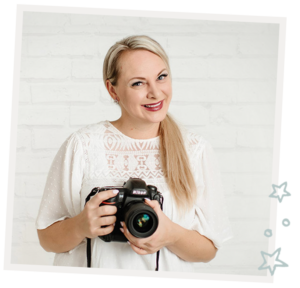
I'm
Lisa DiGeso
I’m on a mission to create uplifting online experiences for photographers ready to elevate their art, their business and their mindset.(...and have fun along the way!)





